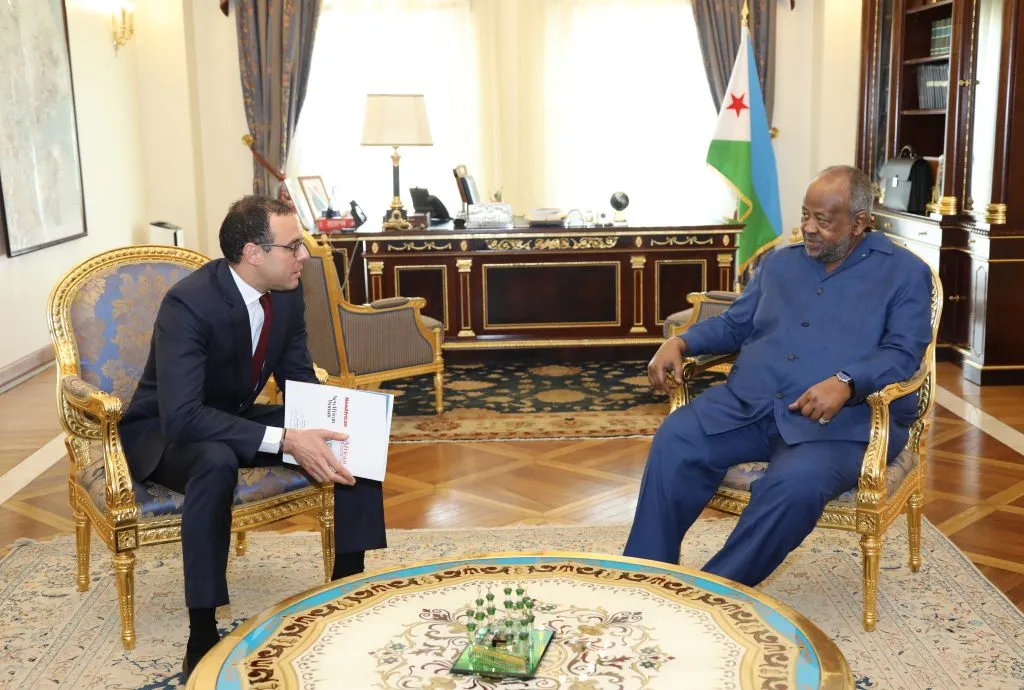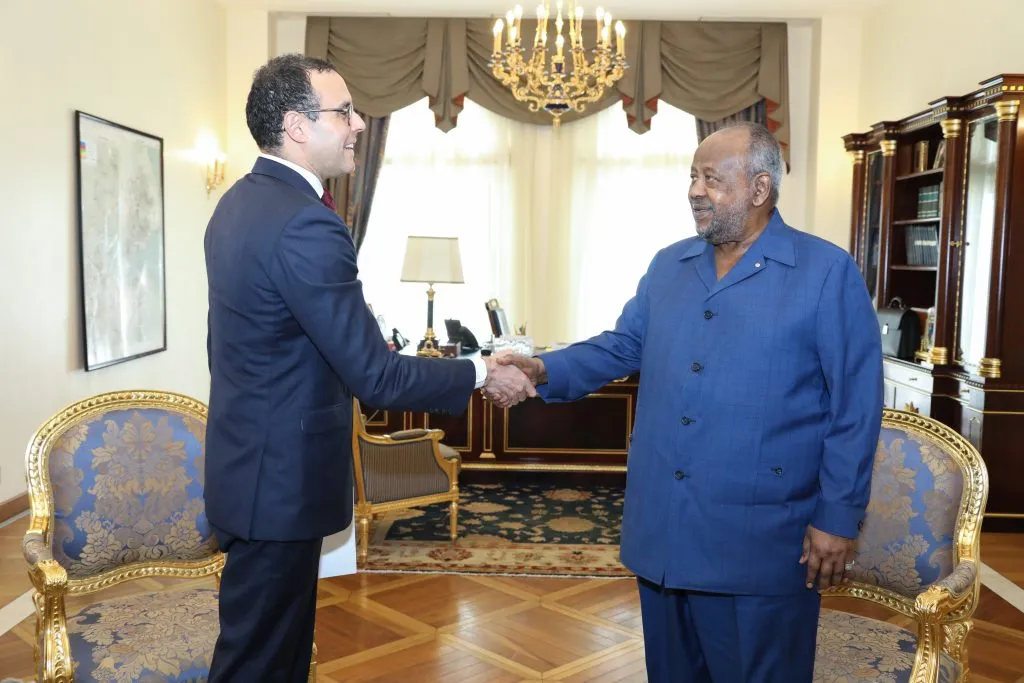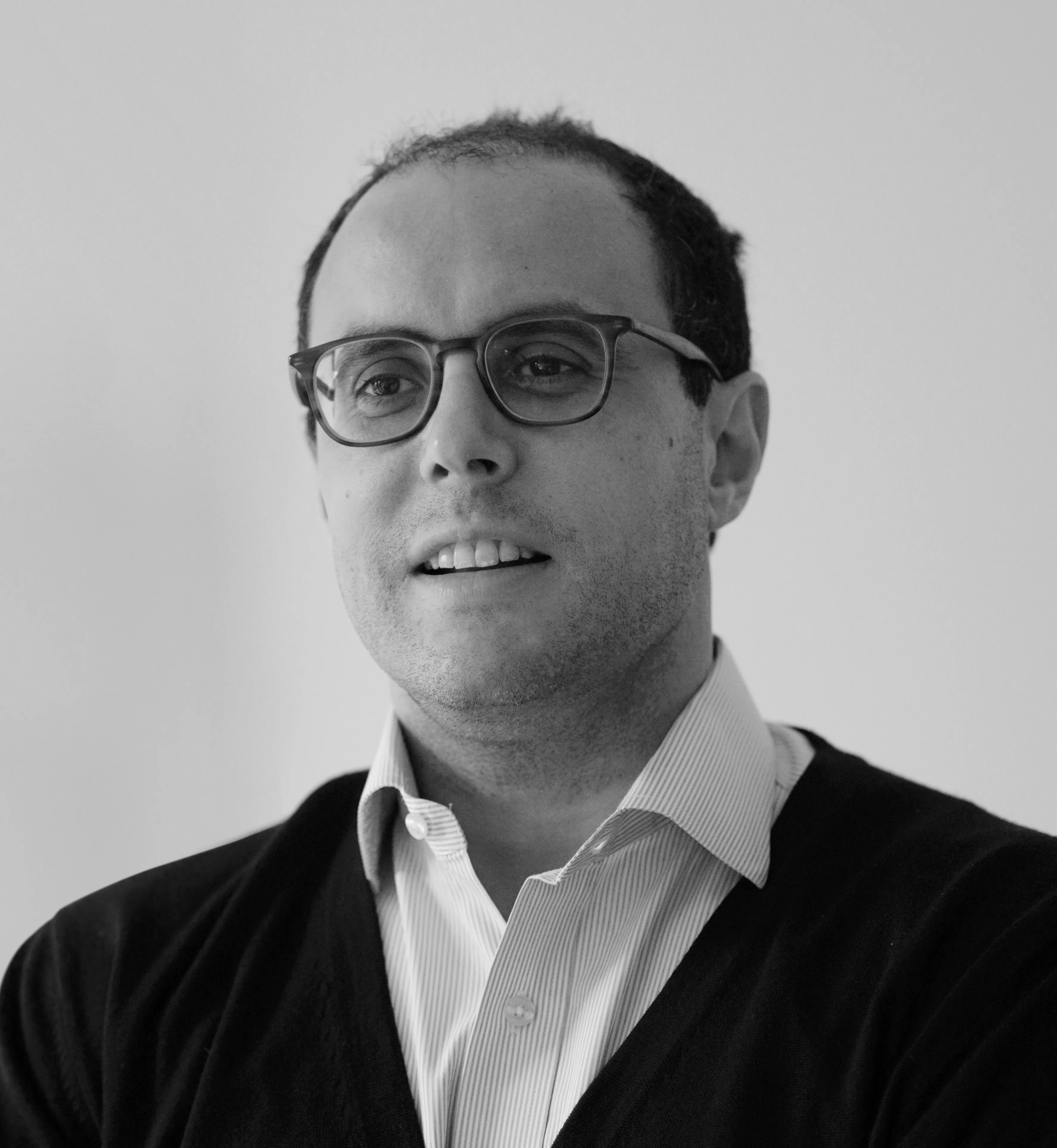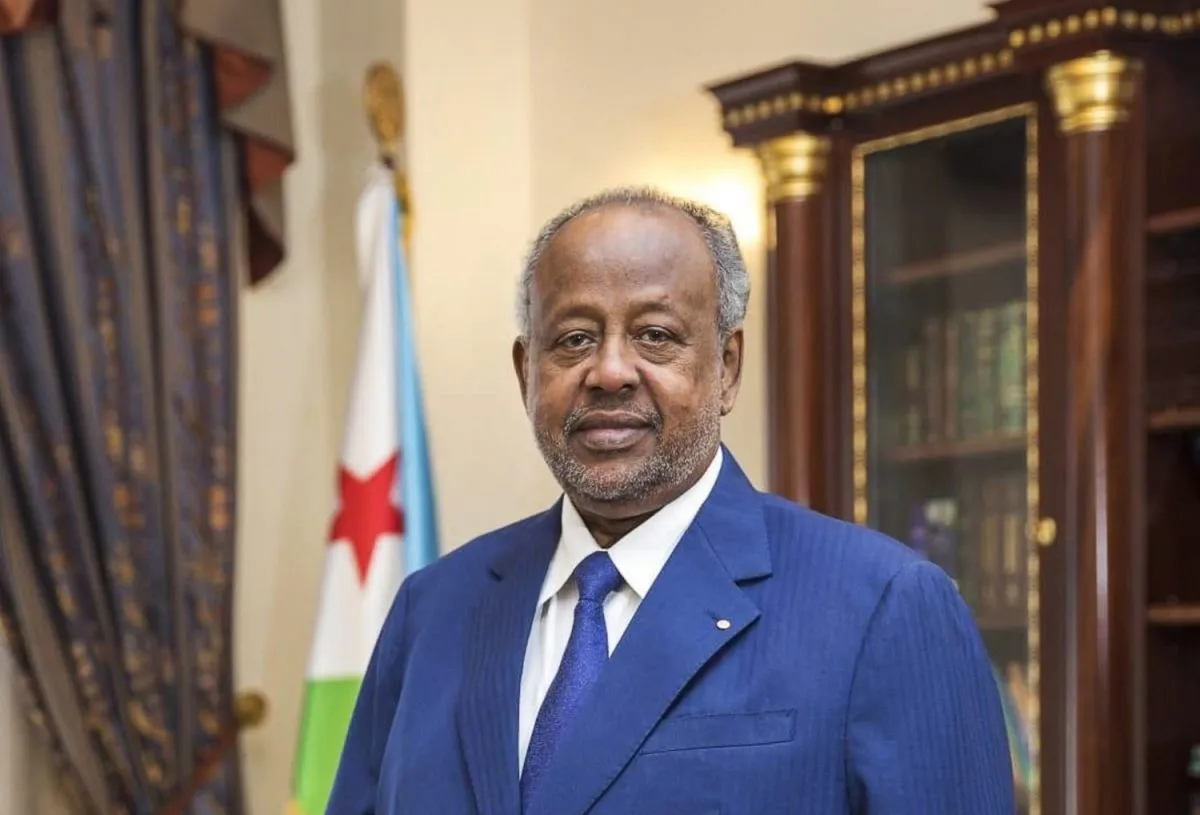Djibouti is known for its stability – and as a strategic location for a number of military bases. Yet you operate in a region that is increasingly volatile. How are you managing the situation?
H.E. Guelleh: Djibouti has stability, social cohesion and tolerance. But it’s also dynamic. We enjoy a strategic position as a commercial and security hub. Which means that when the Horn of Africa – and by extension the Red Sea – is punctuated by periods of prosperity and then conflicts of interest, we experience the sawtooth curve of development.
Today, in our region there are conflicts which have significant region-wide repercussions in economic, commercial and humanitarian terms. But our history makes us resilient and equipped to defend ourselves.
In all major crises, we adopt a posture that shows character. We withstand these shocks by maintaining balance and ambition.
We have always had a proactive foreign policy based on dialogue, moderation, mediation and innovation, that provides concrete solutions aiming to safeguard stability, peace and economic development.
As a neutral country that respects international law, we work actively with our regional and international partners to find solutions to ongoing crises. We firmly believe in the principle of peaceful conflict resolution and encourage all parties concerned to engage in constructive dialogue to achieve lasting results.
We attach great importance to regional and international security cooperation within IGAD, the African Union, the United Nations – and to working with our partners to strengthen security and stability in the region.
I can tell you that Djibouti is determined to play a constructive role in promoting peace and prosperity, and to work towards a better future for all the peoples of the region.
You are known for being a skilful political operator on the international stage and for bringing people together. Who else could have both Chinese and American military bases? How do you position yourself when Africa, including Djibouti, is criticised for moving closer to the Chinese or other partners – especially on issues of debt and infrastructure?
H.E. Guelleh: As a sovereign nation, Djibouti maintains diplomatic relations with countries around the world, including China and the United States. Our location and policy of neutrality enable us to maintain partnerships with international players, including those with military bases on our territory.
We see the presence of Chinese and American military bases in Djibouti as a manifestation of the confidence these countries place in our nation as a strategic partner.
As far as the partnership with China is concerned, I think it is unfair and inappropriate to put African countries on trial for their intentions. The same countries that make such criticisms are the first to rush to China, which is undeniably an economic and commercial power.
We adopt a cautious and balanced approach with all our partners. We are committed to making the most of our relations with them, while ensuring that these relations are mutually beneficial and respectful of our national interests and the principles of international law.
With regard to debt issues, we attach great importance to transparency, sustainability and accountability in the management of our public finances and our partnerships with international donors. We ensure that all external financing is used responsibly and effectively to stimulate our country’s economic and social development, while avoiding excessive debt and financial dependence.
With regard to infrastructure, we see foreign investment, including from China, as an opportunity to strengthen our infrastructure capacity and promote our country’s economic and social development. However, we ensure that these investments comply with our environmental, social and governance standards, and that they contribute to the wellbeing of our people and sustainable economic growth.

It has been said that Djibouti has been underselling its services as a host to military bases. Are you seeking to renegotiate conditions with each country? Discussions are underway with France…
H.E. Guelleh: It is important to stress that our country considers collective security to be an absolute priority, which is why we host several international military bases on our territory.
Each country has arrived in a different context: France, as a historic partner, has maintained troops in Djibouti since independence as part of a bilateral military cooperation treaty. The United States has been present since the 11 September attacks as part of the fight against terrorism. Japan and Italy, as well as the European Atalanta Force, have deployed troops as part of the fight against piracy. The Chinese came later in the same context.
It is essential to understand that in this type of relationship the gains are not limited to money. There are political, diplomatic and economic benefits – particularly in terms of job creation.
Our military partnerships with these countries also give rise to genuine military cooperation, aimed in particular at strengthening our security capabilities and enabling us to play an active part in peacekeeping and regional security operations.
But it is fair to say that we no longer intend to bear the costs associated with the presence of foreign troops on our territory. Foreign forces benefiting from facilities granted to them in the past generate a significant financial shortfall for us today. It is therefore entirely legitimate for us to renegotiate a number of agreements in order to review our partnerships so that they are balanced and mutually beneficial.
We have conducted several rounds of negotiations with France involving experts and ministers. The discussions are progressing constructively and we are confident that we will reach a symmetrical final agreement that guarantees the interests of both parties.
Djibouti is known for its political and economic stability, its fixed exchange rate, and also its port, the second most efficient in Africa after Tangiers according to the World Bank. You have 12 undersea cables that cross the country. You set out a vision for 2035. Perhaps you could tell us how how the plan is progressing in terms of the milestones you have set?
H.E. Guelleh: In the two decades prior to the Covid-19 pandemic, we made significant economic and social progress, strengthening the development of our people and the infrastructure that serves them. Thanks to our policies and our strategic investments, we recorded a fivefold GDP increase since 2000.
Human Development Index measurements rose by 41% between 2000 and 2019. The rate of extreme poverty we experience fell from 22.3% in 2013 to 17% in 2019. Ninety per cent of our population has access to drinking water. School enrolment has risen to 91%.
This work has laid the foundations for long-term political and economic stability in our country. And that consolidates our role as a major player in the region.
This progress comes in the light of serious stress-tests. The Covid-19 pandemic; regional conflicts; climate change; geopolitical tensions such as the war in Ukraine, and the crisis in the Red Sea. These events highlight the need for Djibouti to diversify its economy and strengthen its resilience in the face of external shocks.
We are doing this by building on Djibouti’s competitive advantages. Its political and economic stability, its fixed exchange rate, the quality of its ports and submarine cable infrastructure. We are consolidating our position as a regional and international commercial hub using the best tools available to us.
Like in many emerging countries the state plays an outsized role to stimulate investment. How can you encourage the private sector?
H.E. Guelleh: The state has played a dominant role in our economy through state-owned enterprises, which have built our basic infrastructure and made our economy attractive. These companies have performed well, but we now need to reform and promote the growth of the private sector. It is the key driver for sustained economic growth. But right now, the bulk of enterprises are small-scale and driven by short-term opportunities in the service sector.
We are changing this. Regulatory barriers; high taxation; the cost of electricity – all of the things that hinder growth are being removed. We are simplifying administrative procedures, reducing energy costs and creating a more favourable business environment to attract investment. The creation of the Djibouti Sovereign Wealth Fund in 2020 was a major part of this work.

We understand Djibouti was inspired by Singapore’s Sovereign Wealth Fund, Temasek, to create its own Fund. What are your expectations of it?
H.E. Guelleh: The Djibouti Sovereign Wealth Fund is our main tool for attracting public and private capital so that we can support our socio-economic development through projects in key sectors like sustainable infrastructure, tourism, green energy and communication technologies.
Our Strategic Vision 2035 requires that the fund consolidate our role as a port and digital hub while diversifying our economy and promoting inclusive prosperity. It establishes partnerships with investors, promotes transparency, good governance and real socio-economic impact. This strengthens our position on the international stage and promotes mutually beneficial cooperation with other countries and sovereign wealth funds.
You are a gateway to a market of 400 million people. Is the African Continental Free Trade Area (AfCFTA) helping you and your companies set up to serve the sub-region?
H.E. Guelleh: We are making significant contributions to the AfCFTA. We facilitate the transit of goods between African nations as a regional logistics hub. We reduce transport costs and times. We invest in port, rail and road infrastructure to strengthen intra-African trade and connect remote regions of the continent. We just need more – and that comes from being open to investment.
Our free zones and industrial parks offer tax incentives and facilities to businesses to fuel intra-African trade. By working with other African countries, including within the Intergovernmental Authority on Development (IGAD), Djibouti is promoting regional economic integration and helping to strengthen AfCFTA to stimulate economic growth and sustainable development on the continent.
Djibouti is the IGAD chair this year. What will you achieve in 2024?
H.E. Guelleh: As President of IGAD, we are fully committed to the promotion of peace, security and development in the region.
As a seat and founding member country, we will resolve the crises that affect our region by strengthening the IGAD Regional Economic Community.
We are ambitious. We will continue to help resolve the crisis in Sudan, working with all parties concerned to facilitate a peaceful and sustainable political transition. Similarly, we are focusing on monitoring the situation in Southern Sudan and working to support efforts to end conflict and promote national reconciliation in that country.
Security and peace remain at the top of our agenda, particularly in view of the ongoing crisis between Somalia and Ethiopia. We are stepping up our efforts to resolve this major new crisis.
At the same time, we are making IGAD a more effective and responsive organisation through reform. The adoption of a new charter at the IGAD Summit in Djibouti last June strengthened IGAD’s functioning and improved its ability to respond to regional challenges.
We are also building IGAD’s new headquarters. This demonstrates our commitment to strengthening its capacity to serve the needs of our member states.
As Chair of IGAD, Djibouti will spare no effort to maintain the cohesion of our organisation.
We know the challenges. We are resolute, ambitious, realistic and measured as to how we will overcome them.
Want to continue reading? Subscribe today.
You've read all your free articles for this month! Subscribe now to enjoy full access to our content.
Digital Monthly
£8.00 / month
Receive full unlimited access to our articles, opinions, podcasts and more.
Digital Yearly
£70.00 / year
Our best value offer - save £26 and gain access to all of our digital content for an entire year!

 Sign in with Google
Sign in with Google 



